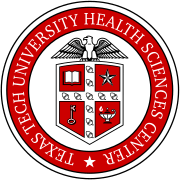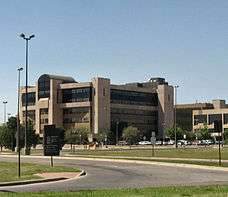Texas Tech University Health Sciences Center
The Texas Tech University Health Sciences Center (TTUHSC) is a public medical school based in Lubbock, Texas, with additional campuses in Abilene, Amarillo, Dallas, El Paso and the Permian Basin. TTUHSC serves more than 100 counties in the western portion of Texas. The university is a separate institution from Texas Tech University; both universities are among four universities that are part of the Texas Tech University System.
 | |
| Motto | Your Life, Our Purpose. |
|---|---|
| Type | Public medical school |
| Established | May 1969 |
Parent institution | Texas Tech University System |
| Endowment | US$267 million[1] |
| Chancellor | Tedd L. Mitchell |
| President | Tedd L. Mitchell |
| Students | 4,625 (Fall 2016) |
| Location | , , United States |
| Campus | Urban |
| Colors | Scarlet and Black[2] |
| Website | www |

Schools
School of Health Professions
The school began in 1983 as the School of Allied Health Sciences and currently has campuses in Amarillo, Lubbock, and the Permian Basin. More than 1,800 students are currently enrolled in 20 different degree programs at the doctoral, master’s and baccalaureate degree levels. These programs include areas of study, such as athletic training, audiology, clinical management, medical laboratory science, molecular pathology, physical and occupational therapy, physician assistant, rehabilitation, and speech-language pathology.[3]
School of Medicine
The Texas Tech University Health Sciences Center School of Medicine in Lubbock has awarded more than 3,000 Doctor of Medicine degrees since its first graduating class in 1974.[4][5] The school was commissioned to train physicians to help meet the health care needs of residents of West Texas, a population that now includes more than 2.5 million people. When the school opened, West Texas had one physician for every 1,300 residents. Currently, the ratio is about one physician for every 750 residents. Students spend their first two years of study in Lubbock and their last two years studying in Amarillo, Odessa or Lubbock. A self-proclaimed major initiative for the school is to "recruit creative, innovative research faculty and to develop graduate students and postdoctoral fellows for lifelong careers in medical research."[4]
School of Nursing
The school has campuses in Lubbock, Permian Basin, Highland Lakes, and Abilene; and it educates more than 1,000 students each year. Bachelors, masters, and doctoral degrees in nursing are issued by the school. The School of Nursing offers the only Doctor of Nursing Practice program in West Texas. The school is known for its alternatives to traditional educational opportunities including online coursework for a registered nurse to obtain a Bachelor of Science in Nursing, a second-degree Bachelor of Science in Nursing program for students with a bachelor's degree in another subject, and a Veteran to Bachelor of Science in Nursing degree for veterans with military medical experience who wish to earn a nursing degree but already have considerable knowledge that distinguishes them from a traditional nursing student.[6]
School of Pharmacy
The School of Pharmacy’s administrative hub is located in Amarillo and the school has regional campus sites in Lubbock, Dallas and Abilene. The school has two Dallas-area regional sites: one located on the grounds of the North Texas Veterans Administration Medical Center and the second located within the central Dallas medical district.
Lubbock faculty and residents also operate the TTUHSC Pharmacy, which provides medications and biologicals to the Texas Department of Criminal Justice Montford Unit Regional Medical Facility; the TTUHSC International Pain Institute; the Garrison Geriatric Education and Care Center; and TTUHSC clinics in Lubbock, Odessa and El Paso. The TTUHSC Pharmacy also provides telepharmacy services to the rural communities of Turkey and Earth, Texas. The first telepharmacy prescription dispensed in Texas occurred September 18, 2002, between the TTUHSC Pharmacy and the Turkey Medical Clinic.[4]
- Department of Pharmacy Practice
- Department of Pharmaceutical Sciences
- Department of Biomedical Sciences[7]
Campuses
| Campus | Allied Health | Biomedical | Medicine | Nursing | Pharmacy | Total |
|---|---|---|---|---|---|---|
| Abilene | – | 7 | – | 154 | 145 | 306 |
| Amarillo | 51 | 38 | 101 | – | 298 | 488 |
| Dallas | – | – | – | – | 146 | 146 |
| Distance | 565 | – | – | 1,102 | – | 1,667 |
| El Paso | – | 21 | – | – | – | 21 |
| Lubbock | 627 | 102 | 477 | 344 | 36 | 1,586 |
| Permian Basin | 161 | – | 50 | 38 | – | 249 |
| Total | 1,404 | 168 | 628 | 1,638 | 625 | 4,463 |
Institutes & centers
- F. Marie Hall Institute for Rural and Community Health
- Garrison Institute on Aging (GIA)
- The Institute of Environmental and Human Health (TIEHH)
- Laura W. Bush Institute for Women's Health (LWBIWH)
- Center of Excellence for Geriatric Scholarship, Training, and Faculty Development
- Center of Excellence in Evidence-Based Practice (CEEBP)
- Center for Innovation in Nursing Education (CINE)
- Center for International and Multicultural Affairs (CIMA)
- Center for Membrane Protein Research
- Center for Rehabilitation Research
- Pediatric Pharmacology Research and Development Center
- School of Medicine Cancer Center
- School of Pharmacy Cancer Biology Center (CBC)
- South Plains Alcohol and Addiction Research Center (SPAARC)
- University Medical Center Southwest Cancer Treatment Center
- Vascular Drug Research Center
- West Texas Influenza Center
Objectives
The presence of TTUHSC has impacted the access to health care in West Texas. Over 20% of the physicians currently practicing in West Texas are TTUHSC medical school or residency graduates. The schools of Nursing and Health Professions impact West Texas, with most of their graduates remaining in West Texas to pursue their chosen profession. Over 80% of School of Pharmacy graduates have chosen to practice in Texas.[9]
Traditions
White Coat Ceremony
Usually held in August, a new group of first-year medical students participate in the White Coat Ceremony each year. This event is a rite of passage for first-year medical students as they don their coats and take a Hippocratic oath affirming their commitment to the highest standards of ethics and patient care. At the TTUHSC School of Medicine in Lubbock, the ceremony is held at the Lubbock Memorial Civic Center.[10]
People
Alumni

- Donna Campbell, member of the Texas Senate, is an emergency room physician from New Braunfels. She graduated from Texas Tech with her M.D. in 1989.[11]
- Bernard A. Harris Jr. graduated from the SOM in 1982 before becoming an astronaut with NASA and has spent more than 400 hours in space.[12]
Faculty
- Bernard T. Mittemeyer
- Tom Shires
- Amy Doneen, DNP
Presidents
- David R. Smith
- M. Roy Wilson
- Bernhard T. Mittemeyer (interim)
- John C. Baldwin
- Tedd L. Mitchell
- Lori Rice-Spearman
References
- "Leading the Way - 2011 Performance and Accountability Report" (PDF). 2011 Texas Tech University Performance and Accountability Report. Texas Tech University System.
- "Official Colors". Texas Tech University. Retrieved June 4, 2018.
- State of Texas and Texas Tech University Health Sciences Center. "SAHS". Archived from the original on January 4, 2015. Retrieved January 4, 2015.
- State of Texas and Texas Tech University Health Sciences Center. "About our school". Archived from the original on January 5, 2015. Retrieved January 4, 2015.
- "TTUHSC :: School of Medicine : Admissions : FAQ". Retrieved January 4, 2015.
- Archived November 17, 2010, at the Wayback Machine
- "Texan TUCSAN" (PDF). Ttuhsc.edu. Retrieved January 5, 2015.
- "Strategic plan report" (PDF). www.texastech.edu. 2015. Retrieved June 20, 2019.
- "Microsoft Word - COVER.doc" (PDF). Ttuhsc.edu. Retrieved January 5, 2015.
- "Candidate profile: Dr. Donna Campbell". texasgrizzlette.com, August 2010. Archived from the original on January 11, 2013. Retrieved January 2, 2013.
- "Biographical Data: Bernard A. Harris, Jr". NASA. Retrieved August 13, 2008.